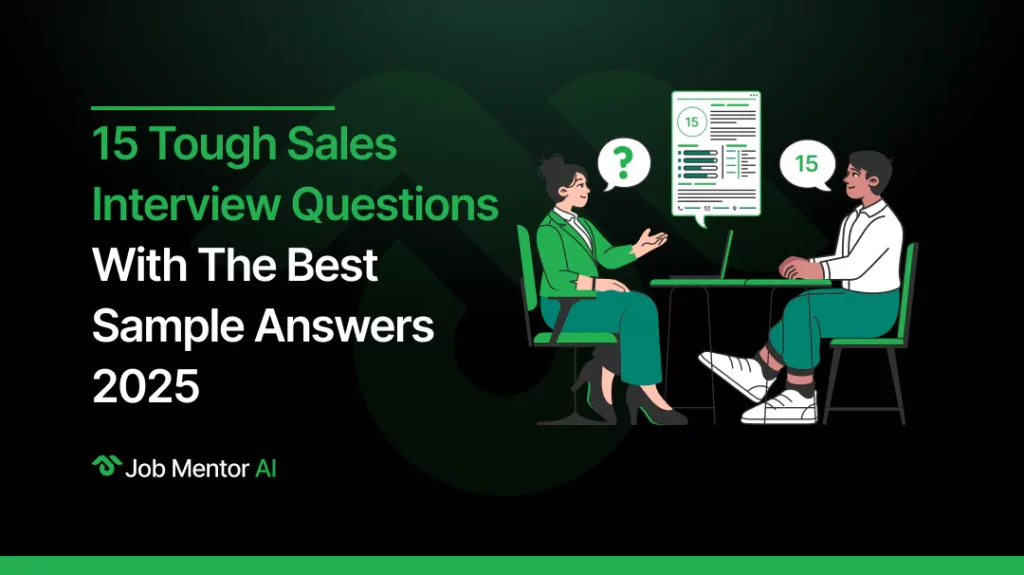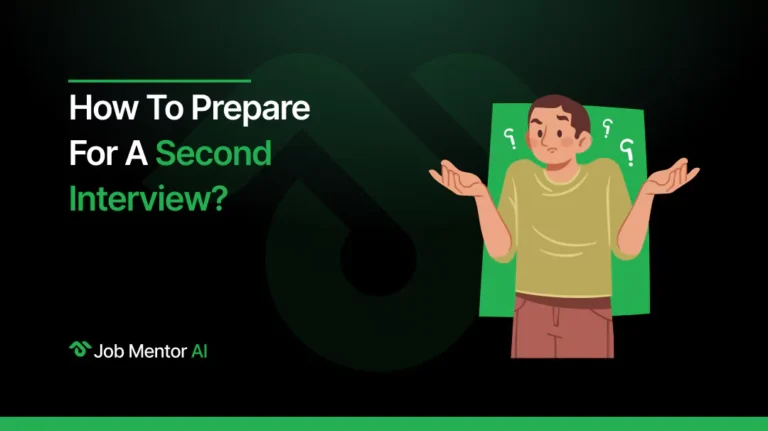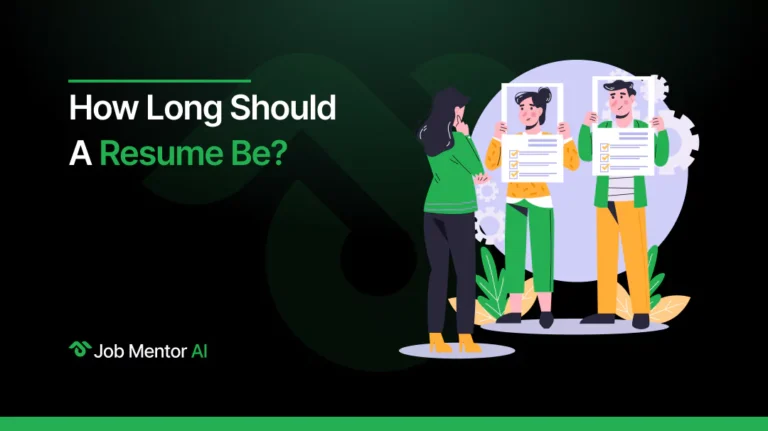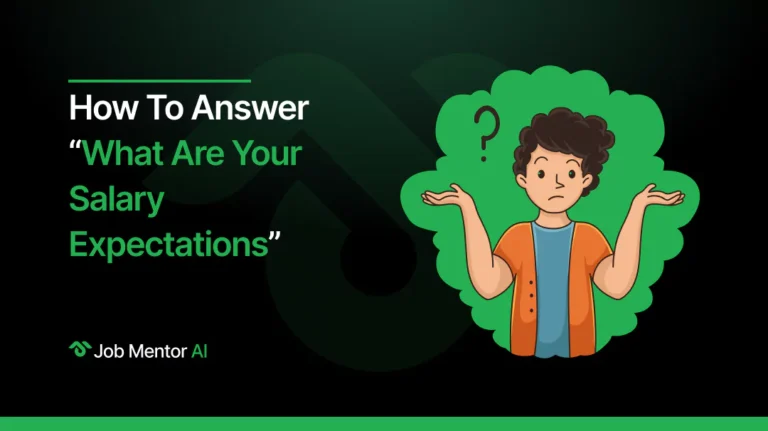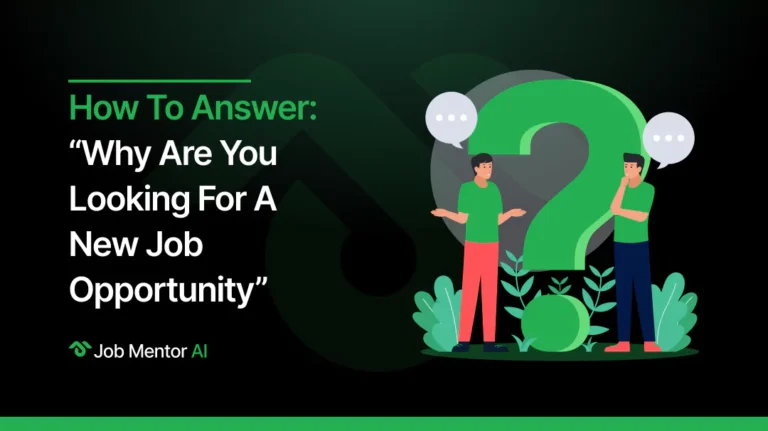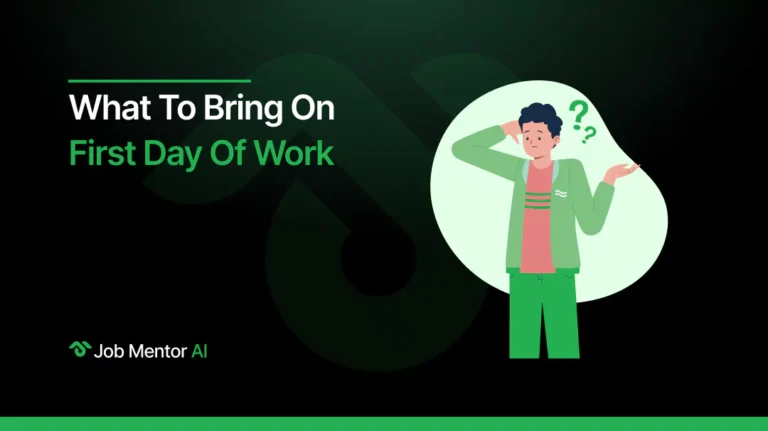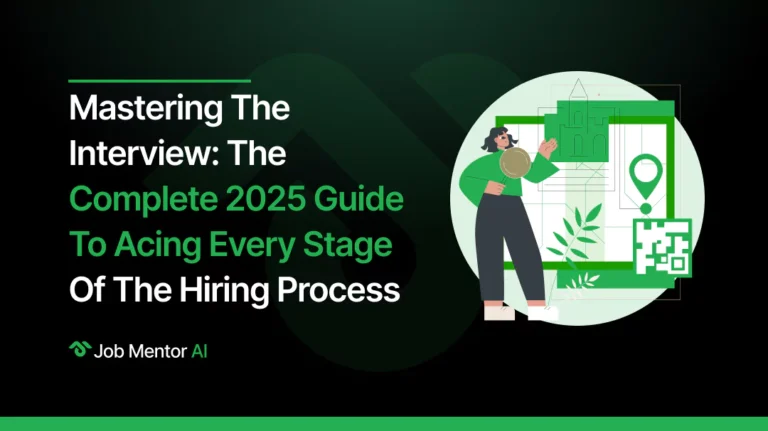Walking into a sales interview can feel like walking onto a stage, all eyes on you, expecting confidence, persuasion, and the right answers. It’s not enough to know your resume or your sales numbers. You need to anticipate the tough questions that hiring managers love to ask the ones that really test your thinking, attitude, and problem-solving skills.
In this guide, you’ll find 15 of the toughest sales interview questions along with thoughtful, practical sample answers that can help you prepare and feel more confident.
Top 15 Tough Sales Interview Questions
Let’s face it, sales interviews are never simple. You can’t just walk in and expect basic questions about your resume. Hiring managers like to dig deeper and throw questions that make you think on your feet. To save you from being caught off guard, here’s a list of some of the toughest sales interview questions you’re likely to hear. It’s always better to be ready than surprised.
- What makes you a good salesperson?
- How do you handle rejection?
- Describe a time you turned a ‘no’ into a ‘yes.’
- What motivates you in sales?
- How do you research your prospects?
- What’s your approach when a prospect raises price objections?
- Tell me about a deal you lost. What did you learn?
- How do you stay motivated during slow sales periods?
- What’s your favorite part of the sales process?
- What sales metrics do you track?
- How do you handle competing priorities?
- What do you do if a client says they’re happy with their current supplier?
- How do you keep yourself organized?
- What’s your strategy for closing sales?
- Why do you want to work in sales for this company?
1. What makes you a good salesperson?
Sample Answer:
I believe sales is more about listening than talking. A good salesperson understands the customer’s problem first before trying to sell anything. I focus on building trust, offering solutions that truly fit the client’s needs, and following up consistently. These habits have helped me close deals and build long-term relationships with clients.
2. How do you handle rejection?
Sample Answer:
Rejection is part of the game in sales. I never take it personally. Instead, I try to understand why the prospect said no. Was it timing, budget, or product fit? Sometimes a “no” today becomes a “yes” later. I’ve actually had clients come back months after an initial rejection because I kept the relationship alive.
3. Describe a time you turned a ‘no’ into a ‘yes.’
Sample Answer:
Once, a potential client was firm on not switching vendors. I asked more about their pain points and learned they had delivery delays with their current supplier. I used that to show how our service could guarantee on-time deliveries, saving them both time and money. After a few conversations, they agreed to try us for three months and stayed on permanently.
If you’re looking for ways to boost your confidence right before an interview, these last-minute interview tips can make a huge difference.
4. What motivates you in sales?
Sample Answer:
Achieving goals motivates me. But more than numbers, I like solving problems. When a client tells me that our solution really helped their business, that’s the best reward. Sales, to me, is more about adding value than closing a deal for the sake of commission.
5. How do you research your prospects?
Sample Answer:
I always start with LinkedIn. I check the company, their recent posts, their leadership team. I also read press releases, industry blogs, and Google News alerts. It helps to know what challenges they might be facing before making a pitch.
6. What’s your approach when a prospect raises price objections?
Sample Answer:
I shift the conversation from price to value. For example, I explain how the product saves time, improves results, or reduces other costs. Price matters, but if the value is clear, price objections often fade away.
Explore Related Blog: Creative interview questions
7. Tell me about a deal you lost. What did you learn?
Sample Answer:
I once lost a deal because I assumed the person I was speaking with was the final decision-maker. Turns out, the real decision-maker was their CFO. Since then, I have always confirmed who’s involved in the buying decision early in the process to avoid that mistake again.
8. How do you stay motivated during slow sales periods?
Sample Answer:
Slow periods are tough, but I use them to build my pipeline, learn new skills, or reconnect with old leads. I also believe in staying positive sales is a long game. A dry spell doesn’t mean failure; it’s part of the process.
9. What’s your favorite part of the sales process?
Sample Answer:
I enjoy the discovery phase the most asking questions, learning about the customer’s needs, and shaping a solution just for them. It’s like detective work. The closing is rewarding too, but the discovery phase is where real value is created.
If you’re preparing for group interviews, these common group interview questions can help you know what to expect especially if the company includes teamwork tasks in their hiring process.
10. What sales metrics do you track?
Sample Answer:
I track lead conversion rates, deal closing times, and customer retention. I also watch average deal size, which shows whether I’m closing higher-value deals or just chasing small wins.
11. How do you handle competing priorities?
Sample Answer:
I prioritize based on deadlines and potential impact. High-value opportunities and urgent tasks come first. I also make daily to-do lists to stay organized and avoid missing anything important.
12. What do you do if a client says they’re happy with their current supplier?
Sample Answer:
I respect their loyalty, but gently ask about any small frustrations they’ve had as no supplier is perfect. This opens the door to show how we can do better in those areas without pushing too hard.
13. How do you keep yourself organized?
Sample Answer:
I use a CRM system religiously. It reminds me of follow-ups, tracks emails, and keeps all client data in one place. I also review my pipeline weekly to keep deals moving forward.
If you want to make a strong impression, don’t forget to prepare smart questions to ask hiring managers. Thoughtful questions show you care about the company, not just the paycheck.
14. What’s your strategy for closing sales?
Sample Answer:
I summarize the client’s needs, remind them how our solution fits those needs, and ask if they feel comfortable moving forward. I make the close feel like a natural next step, not a hard sell.
15. Why do you want to work in sales for this company?
Sample Answer:
I’ve followed your company for a while and admire your focus on customer satisfaction. Your recent product launch shows you’re innovative, and I’d love to contribute by bringing in new clients and growing your market share.
Key Takeaways: Tough Sales Interview Questions with Sample Answers
Get prepared for your next sales interview with these quick tips that highlight the most important skills, approaches, and strategies hiring managers look for.
- Listening matters more than talking in sales interviews.
- Handle rejection positively use “no” as a future opportunity.
- Research prospects well using LinkedIn, blogs, and news alerts.
- Focus on value over price when handling objections.
- Learn from mistakes decision-maker identification is crucial.
- Stay motivated during slow periods by building your pipeline.
- The discovery phase is key to understanding the client’s real needs.
- Track key sales metrics like conversions, deal size, and retention.
- Stay organised using CRMs and task lists.
- Gently explore client pain points without hard selling.
- Ask smart, thoughtful questions to hiring managers.
- Use a natural, consultative approach when closing.
- Show specific knowledge about the company you’re applying to.
- Confidence comes with preparation practice is essential.
Ready to nail your next sales interview?
Preparation is key when it comes to handling tough questions that hiring managers love to ask. It’s not just about knowing your achievements but about how well you can communicate them under pressure. Many candidates now rely AI interview Copilot to organize their thoughts or an AI interview answer generator to fine-tune their responses for tricky scenarios. But at the end of the day, what really counts is sounding real, confident, and authentic because that’s what makes you stand out in any interview room.
Conclusion
Sales interviews are rarely easy they test your confidence, thinking, and people skills all at once. But the more you practice these kinds of tough sales interview questions, the more natural your answers will feel.
Remember: it’s not about having a perfect answer every time. It’s about being honest, thoughtful, and showing that you understand what makes a great salesperson. Preparing for every angle, from tricky individual questions to possible group interview questions, will help you feel ready for whatever comes your way.
Table of Contents
Frequently Asked Questions
What is the toughest question ever?
The toughest interview question often depends on the person, but many find questions like “Tell me about a time you failed” or “Why should we hire you?” to be the hardest. These tough interview questions push you to be honest and thoughtful while showing your strengths.
What are some tough questions to answer?
Some of the tough interview questions are given below:
- What makes you a good salesperson?
- How do you handle rejection?
- Describe a time you turned a ‘no’ into a ‘yes.’
- What motivates you in sales?
- How do you research your prospects?
How do I introduce myself in a sales interview?
Learning how to interview yourself well is key to making a strong first impression. When introducing yourself, keep it clear and relevant:
- Start with your name and current role.
- Mention your sales experience briefly.
- Highlight a key achievement or skill.
- Share what motivates you in sales.
- End with why you’re excited about this opportunity.
How to answer tough sales interview questions?
Just be honest, stay calm and use the example from your experience. Highlight what you learned from the challenges and how to handle the situations around you; this shows confidence but don’t oversell yourself.
Why give the best answer in sales interviews?
Your answers should not only show what you know but also how you think and act. Great answers build trust in interviewers, prove that you understood the role better, and show you’re ready to add real value to their team.

